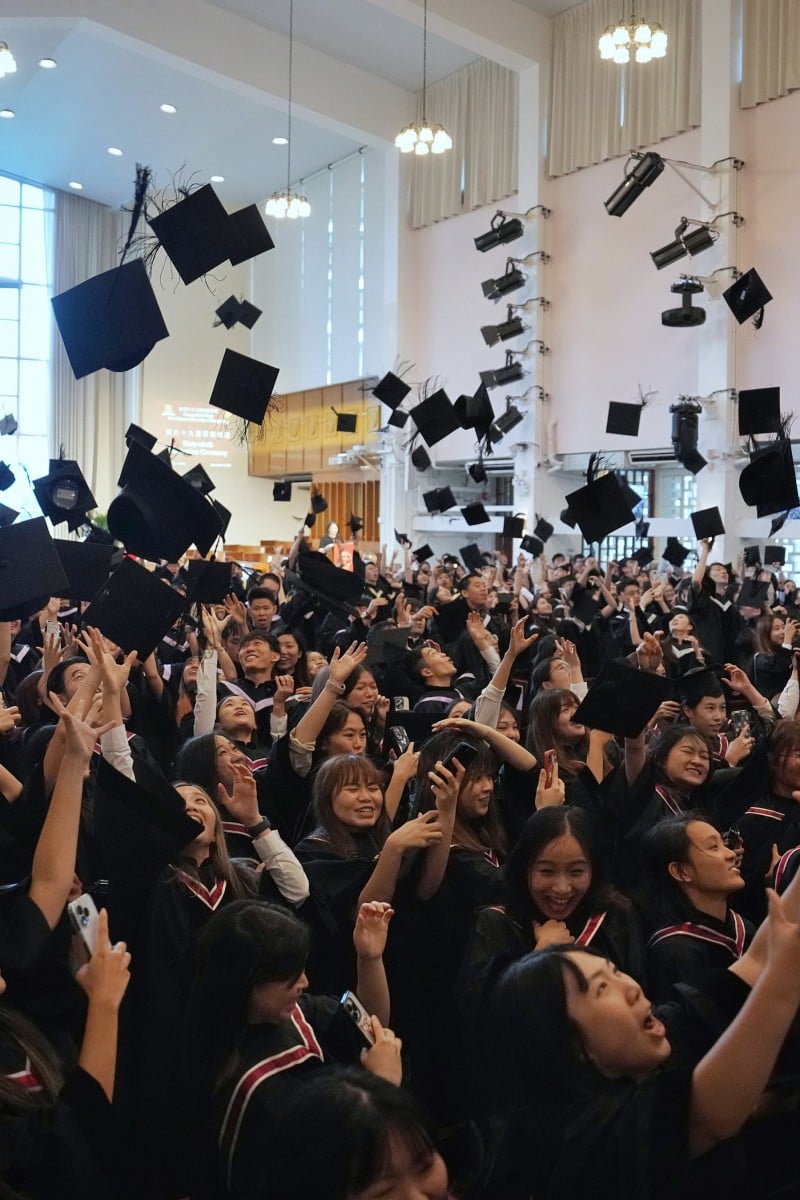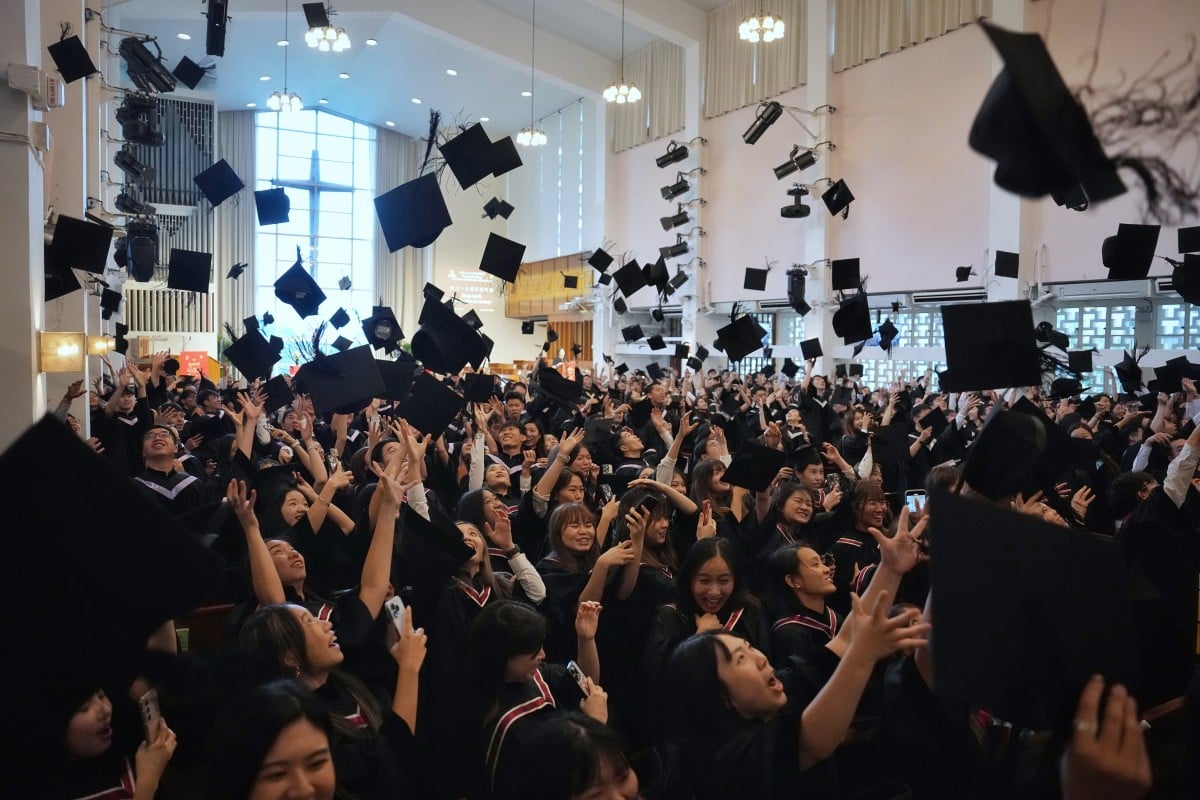
- Government aims to double the number of non-local students in undergraduate, sub-degree and postgraduate publicly funded programmes in 2024-25
- To attract more non-local students, authorities will inject HK$1 billion (US$128 million) into the Government Scholarship Fund
 Can Hong Kong’s top universities attract overseas students and scholars? Photo: Elson Li
Can Hong Kong’s top universities attract overseas students and scholars? Photo: Elson LiHong Kong was Indonesian student Lunaretta Linaura’s choice when she was deciding where to pursue a degree in journalism last year.
She was familiar with the city, having visited previously. Hong Kong had five universities ranked among the world’s top 100 in two major league tables, and it also cost much less to study there than in a Western country.
Lunaretta was pleased to land a spot in the journalism programme at the Chinese University of Hong Kong (CUHK) last year, but it did not take long for disappointment to set in.
“What attracted me was the list of courses provided on the programme’s website,” she said. “It was in English, so I assumed the classes would be available in English. But most of the courses I found interesting were taught in Cantonese.”
CUHK placement scheme ensures smooth transition from school to work
When she tried signing up for the “Creative and New Media” practicum, for example, she was assigned to English news writing instead, as the former lacked courses taught in English.
She also felt uneasy at the start of a student leaders’ training session attended by local and non-local undergraduates.
“There was a question asking local students their stereotype [impressions] of international students, and some of them said there was the issue of hygiene,” she recalled.
She was taken aback by the lack of cultural sensitivity. If she could choose again, Lunaretta said, she would “definitely be more inclined to Western countries”, provided she could afford it.
Bangladeshi Shafayet Yaseen, 22, a third-year engineering physics major at Polytechnic University, said a language and cultural barrier kept Hongkongers apart from non-local students.
He said he felt some Hong Kong students were not confident about speaking in English, and that made them hesitant to mix with international peers.
“I have not made a lot of local friends on campus so far – only two to three, but they are the best,” he said.
He added he had no regrets about choosing Hong Kong. A full scholarship covered his fees, and he appreciated having distinguished professors, the world-class learning environment, opportunities for international research and the city’s proximity to nature.
Number of Hong Kong undergraduates at American universities hits record low
Yaseen, who has been recommended by his professors to join international research laboratories in Germany to work on novel projects, said: “There are plenty of opportunities in Hong Kong and lots of valuable contacts to make, so you need to keep both eyes open from day one to make sure you don’t miss out on them.”
Asked if he would recommend Hong Kong to other Bangladeshi students, he replied: “Absolutely.”
Diverse mix helps universities move up rankings
Lunaretta and Yaseen are among more than 14,000 international students in Hong Kong universities, and the government wants more to come as it develops the city into an international centre for postsecondary education.
Chief Executive John Lee Ka-chiu announced in October that the number of non-local students in undergraduate, sub-degree and postgraduate publicly funded programmes in the 2024-25 academic year would be doubled from the current 20 per cent.
Education chiefs later said the increase would be gradual, adding about 5 per cent more each year.
In the last academic year, 14,147 non-local undergraduate students studied at the eight public universities funded by the University Grants Committee, including 3,907 in their first year.
With the change, another 3,000 non-local students would be admitted each year, with a total of 12,000 enrolled annually when the new target is reached. The public universities will also add 13,500 new hostel places by 2027.
To attract more non-local students, authorities will inject HK$1 billion (US$128 million) into the Government Scholarship Fund, increasing the number of recipients from countries in China’s Belt and Road Initiative from 100 to 150 each year.
Hong Kong gets first full-time college for adult prisoners
There are many more scholarships available for non-local students, including those from the universities.
The government has also earmarked funds for an international campaign to promote Hong Kong as a study destination.
Although more non-locals have been coming to study in Hong Kong, critics have suggested the city’s universities have been experiencing mainly a “mainlandisation” – meaning mainland Chinese students have dominated the intake.
The University Grants Committee data confirmed that their proportion among non-locals has been rising, from almost 60 per cent in the 2018-19 academic year to 67.6 per cent in the last academic year.
At the University of Hong Kong (HKU), one of the institutions in the city with the largest population of international undergraduates, mainlanders made up 56 per cent of non-locals in the 2021-22 school year, and that was the only group which grew.
Students from other Asian countries made up just over a third of the non-local undergraduates, with those from Europe accounting for about 5 per cent, North America 3 per cent, and Australia and New Zealand 2 per cent.
Global rankings of universities take into account the make-up of students and faculty members, and having more non-locals helps institutions rise up the list.
The best known QS and Times Higher Education rankings have five Hong Kong public universities among the global Top 100 – HKU, CUHK, the Hong Kong University of Science and Technology (HKUST), Polytechnic University and City University (CityU). HKU and CUHK made the Top 50.
Ben Sowter, senior vice-president at British firm Quacquarelli Symonds, which puts out the QS rankings, said diversity was one of 11 criteria in its latest Asia University Rankings 2024, adding it had affected Hong Kong institutions.
Students with special educational needs start a new chapter at City University
“A downward trend for international faculty and students is apparent, signalling an imperative for university leaders and policymakers to focus on bolstering Hong Kong’s stature as a premier study destination to sustain its competitive edge on the world stage,” he said in a statement accompanying the list, which was released in November.
In the earlier “Best Student Cities” list released in July, Hong Kong’s ranking slid to 21st from 12th, the lowest since the table appeared in 2012.
For “student mix”, reflecting the number of international students and inclusiveness, Hong Kong dropped from 25th in 2016 to 72nd. For “students’ voice”, where students rated the city’s friendliness, sustainability and diversity, it slipped from 22nd last year to 35th.
Bangladeshi Trichi Chakma, 21, a third-year undergraduate majoring in business and administration at CUHK, and president of its International Student Association, said hosting welcome activities for freshmen this year helped her to see the diversity on campus and make friends.
She said the generous government scholarship drew her to the city, covering her fees and housing. CUHK’s strong ranking and career opportunities at multinational corporations also helped her decide.
Trichi said some of her classmates who were paying their way struggled with the city’s high rents, and this was something she would make her friends in Bangladesh aware of.
“Since international students are not permitted to do off-campus jobs during term time, they need financial support unless they get enough funding from the university to cover their living expenses,” she said.
Hong Kong does not allow undergraduates to work off-campus, unlike other countries which allow international students to take up part-time jobs, subject to maximum working hours.